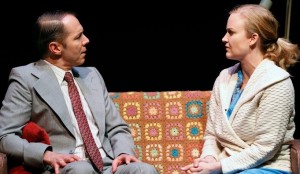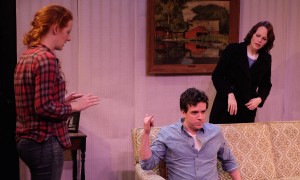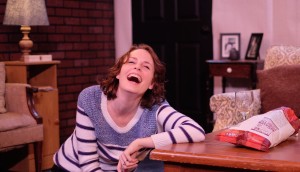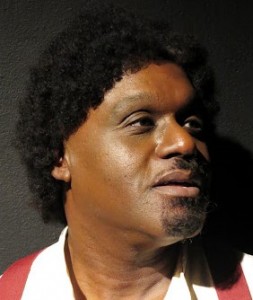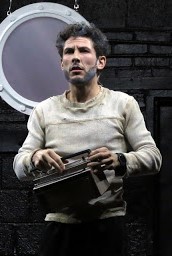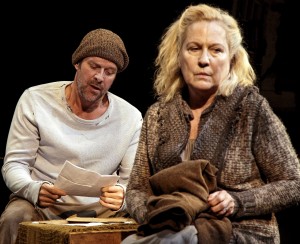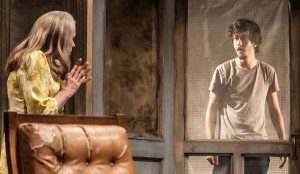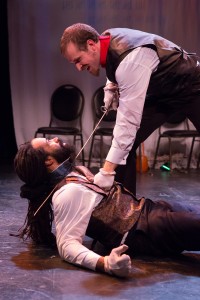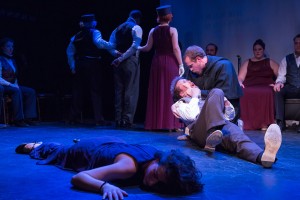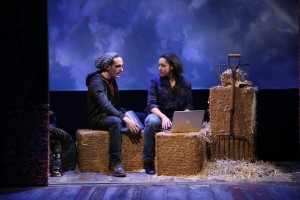Real theater ignites our sense of moral duty and mirrors what is good and bad in our society. Writer Seanie Sugrue clearly does that in One Way to Pluto!, a seething reprimand of our irrational times. With humor and bite, Sugrue uses engaging dialogue to serve his thematic purpose: that we are fragile and easily broken in a brittle, capitalistic, greedy, political society that has lost its empathy. His characters’ rich dialogue stings in this punked-out philosophical commentary on our world.
Sugrue’s drama is reminiscent of the works of Sam Shepard, Harold Pinter, and Samuel Beckett. The playwright, who also directs, combines quick-witted moments with original music (by the downtown band Acquiesce) to create a CBGBs-style energy, earning its label of “punk theater.” With fine craftsmanship, Sugrue and his troupe, including designers, have memorably fused words and music together.
The story begins when Peter Cooper, a young musician struggling to find himself in New York City, wakes up to an escort, Tiffany (a sexy Jenni Halima), who demands money, and to Sean Dempsey, his irate Irish landlord, screaming for several months’ rent. Peter escapes the tougher realities of life as a poor artist, grappling with his sexuality by shooting up, dressing in drag, and running away.
Patrick Brian Scherrer gives a seismic performance as Peter, whose torment fits Sugrue’s dramatic response to the many serious issues of today. (The character performs a painful drug dance in drag that shows his inner turmoil.)
Sean (Myles O’Connor) as the ferocious landlord fed up with trying to help Peter espouses the playwright’s views with righteous indignation, spitting out lines like, “Everyone wants to die until they find out they’re going to.”
The Utah-born Tiffany, Peter’s paid-for one-night stand, offers him a no-nonsense perspective on life as she flits around disgusted at his living conditions—dirty and sparse. Social commentary on the city’s housing situation from the escort in ripped stockings really lends the piece a raw, punk edge.
Particularly fun to watch was Peter Halpin’s eccentric performance as Johnny, a “Billy Idol wannabe” Romeo who fires Peter from the band. Halpin’s kinetic, slithery movements were hilarious. Johnny changes persona with each new rock-and-roll fad, and Halpin’s ability to switch from Sid Vicious characterizations to a Rod Stewart “club” performance without forsaking the role of Johnny enhanced Sugrue’s insight into the superficiality of the gentrification of arts in New York City. Contrasting with the wilder moments is a scene when Peter steals from his mother, Molly: Mary Tierney conveys maternal anxiety and shows that an addict’s pain affects those who love him. And Courtney Torres plays a nerdy, college student, Charon, willowy and vulnerable and intruding on Peter’s homestead. Charon’s neurotic fluidity dances in step with Peter’s.
A minimalist set reflects the grit and grunge of the punk scene meshed with a Waiting for Godot motif and works brilliantly. Although manic chaos is on the surface of Peter’s struggle, the power of the play is in nothingness: the tone and mood of the set stand in juxtaposition to the thought-provoking dialogue.
A desperate Peter lands in Strawberry Fields, where he meets a homeless man named Dwight. In this whacked-out world, Dwight is the voice of wisdom, an “alchemist” in the urban desert. Played playfully and seamlessly by John Warren, he offers solid answers to the protagonist’s questions.
The most riveting scene occurs in a psychedelic trip to Pluto, where Peter and Dwight see all that is right and wrong in the world. Scherrer lets loose an inspiring rant about “planet of hate.” They ultimately conclude, as Dwight suspected, that John Lennon was right—“all you need is love.”
The play ends poignantly, with Dwight and Peter in their Central Park homestead, at peace with the world. The dramatic juxtaposition of Scherrer’s high-strung Peter with Warren’s mellow Dwight really captures the pathos of the final moment. While Sugrue berates the world for its hate-mongering, he also offers hope after so dark a journey.
Sugrue and Locked in the Attic, fellow producer Amanda Martin, and the historical 13th Street Repertory all have reputations for being politically bold in their presentations. This ensemble of artists inspires social awakening with an “in yer face” punch.
One Way to Pluto! ends tonight at 8 p.m. Tickets at $15 may be purchased at www.13thstreetrep.org or at onewaytopluto.brownpapertickets.com. More information about the jammin' soundtrack may be found at www.aquiesce.com.













